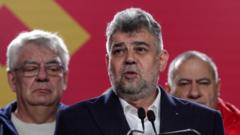Marcel Ciolacu's resignation signals a major shift in Romania's political landscape following the rise of George Simion, an anti-establishment candidate.
Romania in Political Turmoil: PM Ciolacu Resigns After Nationalist Surge

Romania in Political Turmoil: PM Ciolacu Resigns After Nationalist Surge
Romanian Prime Minister resigns amidst nationalist election win, igniting political instability.
In a surprising political development, Romanian Prime Minister Marcel Ciolacu announced his resignation just a few months after taking office, following a significant electoral victory by nationalist candidate George Simion in the first round of the presidential elections. Simion, a eurosceptic and head of a far-right party, garnered 40.9% of the vote, positioning himself as a frontrunner for the run-off scheduled for May 18.
Ciolacu's Social Democrat party has decided to withdraw from the coalition government, citing a lack of legitimacy to continue after failing to achieve its key objectives. His resignation adds further instability to Romania, which plays a crucial role in NATO's eastern defense against rising tensions in the region. Following the election results, Ciolacu emphasized the need for a new governing coalition given the current political landscape and the urgent challenges Romania faces.
The crisis follows popular discontent stemming from the annulment of previous presidential elections last year, with Simion's rise attributed to widespread frustration among Romanian citizens. He has stressed a vision of a Europe of strong, sovereign nations and stands firmly against providing military aid to Ukraine. His impending leadership is causing trepidation among European officials, particularly with regard to Romania's stance on crucial geopolitical issues.
The Social Democrats held emergency meetings Monday to discuss their next actions as they confront a power vacuum that could last for up to 45 days. Critics within Ciolacu's party, including local leaders, have expressed disapproval of their strategic decisions leading to this predicament. Ciolacu's leadership was meant to unify parties around a common presidential candidate, a goal that has clearly fallen short.
Simion's unorthodox political narrative, heavily decorated with nationalistic rhetoric, has resonated particularly well with diaspora voters and the working class. He has positioned himself as an admirer of former U.S. President Donald Trump and has voiced populist sentiments against the political establishment while denying allegations of pro-Russian sympathies.
Political analysts warn that Romania is experiencing a profound political reset, where anti-establishment figures like Simion and liberal challenger Nicușor Dan could reshape the national political discourse. In the wake of this election, observers speculate whether the growing anti-establishment tide will undermine Romania's pro-European Union stance or catalyze a constructive democratic transformation in the nation's governance.
Ciolacu's Social Democrat party has decided to withdraw from the coalition government, citing a lack of legitimacy to continue after failing to achieve its key objectives. His resignation adds further instability to Romania, which plays a crucial role in NATO's eastern defense against rising tensions in the region. Following the election results, Ciolacu emphasized the need for a new governing coalition given the current political landscape and the urgent challenges Romania faces.
The crisis follows popular discontent stemming from the annulment of previous presidential elections last year, with Simion's rise attributed to widespread frustration among Romanian citizens. He has stressed a vision of a Europe of strong, sovereign nations and stands firmly against providing military aid to Ukraine. His impending leadership is causing trepidation among European officials, particularly with regard to Romania's stance on crucial geopolitical issues.
The Social Democrats held emergency meetings Monday to discuss their next actions as they confront a power vacuum that could last for up to 45 days. Critics within Ciolacu's party, including local leaders, have expressed disapproval of their strategic decisions leading to this predicament. Ciolacu's leadership was meant to unify parties around a common presidential candidate, a goal that has clearly fallen short.
Simion's unorthodox political narrative, heavily decorated with nationalistic rhetoric, has resonated particularly well with diaspora voters and the working class. He has positioned himself as an admirer of former U.S. President Donald Trump and has voiced populist sentiments against the political establishment while denying allegations of pro-Russian sympathies.
Political analysts warn that Romania is experiencing a profound political reset, where anti-establishment figures like Simion and liberal challenger Nicușor Dan could reshape the national political discourse. In the wake of this election, observers speculate whether the growing anti-establishment tide will undermine Romania's pro-European Union stance or catalyze a constructive democratic transformation in the nation's governance.



















